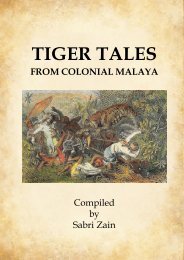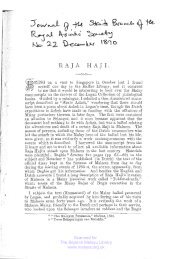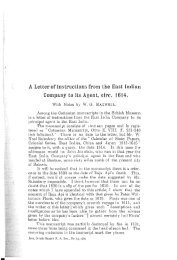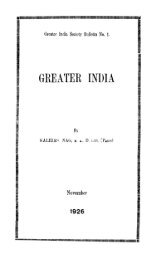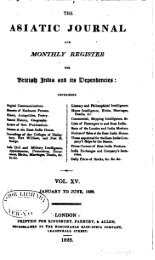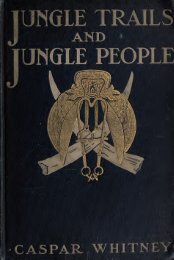- Page 5:
THE MODERN TRAVELLER. rOLVME THE EL
- Page 8 and 9:
LONDON : Printed by W. CLOWES, Stam
- Page 10 and 11:
iv CONTENTS. SIAM. PACK BOUNDARIES
- Page 12 and 13:
2 B1RMAH. glance at the map, that t
- Page 14 and 15:
BIRMAH. of t?*. HJncans into two un
- Page 16 and 17:
6 BIRMAH tile, but thinly inhabited
- Page 18 and 19:
8 BIRMAH. 110 sort of river, yet, t
- Page 20 and 21:
10 BIRMAH. the mountain frontiers.
- Page 22 and 23:
12 BIRMAH. early in the sixteenth c
- Page 24 and 25:
14 BIRMAH. The native name of the c
- Page 26 and 27:
16 BIRMAH. In Dalrymple's Oriental
- Page 28 and 29: 18 BIRMAH. Cshatriya extraction, th
- Page 30 and 31: 20 BIRMAH. mans, lived in a state o
- Page 32 and 33: 22 BIRMAH. story of the circumstanc
- Page 34 and 35: 24 BIRMAH. violence, arising out of
- Page 36 and 37: 26 BIRMAH. aged and unoffending pri
- Page 38 and 39: 28 BIRMAH. with his family to the d
- Page 40 and 41: 30 BIRMAH. of Birmah from Rangoon,
- Page 42 and 43: 32 BIRMAH. sponded to the act of ba
- Page 44 and 45: 34 BIRMAH. state, as if descended f
- Page 46 and 47: 36 BIRMAH. Birmah, they are, nevert
- Page 48 and 49: 36 BIRMAH. attawoon whose daughter
- Page 50 and 51: 40 BIRMAH. and lands for their supp
- Page 52 and 53: 42 BIIIMAH. took refuge in the Dumb
- Page 54 and 55: 44 B1RMAH. long suffered from the a
- Page 56 and 57: 46 BIRMAH. Indian government to sec
- Page 58 and 59: 48 B1RMAH. aries. By this conquest,
- Page 60 and 61: 50 BIRMAH. they advanced as far as
- Page 62 and 63: 5* BIRMAH. civilised and warlike na
- Page 64 and 65: 54 BIEMAH. her population diminishe
- Page 66 and 67: 56 BIRMAH. a month, drive the cattl
- Page 68 and 69: 59 BIRMAH. precision, either the ex
- Page 70 and 71: 60 BIRMAH. raised, on the spur of t
- Page 72 and 73: 62 BIRMAH. who are much better hors
- Page 74 and 75: 64 BIRMAH. I am told, hospitable an
- Page 76 and 77: 60 BIRMAH. language. It has no infl
- Page 80 and 81: 70 HI KMAH. soum or harp, made of l
- Page 82 and 83: 72 BIRMAH. the country : all others
- Page 84 and 85: 74 BIRMAH. of interment, and on the
- Page 86 and 87: 76 BIRMAH. institutions. There, no
- Page 88 and 89: 78 BIRMAH. to some pagoda of import
- Page 90 and 91: 80 BIRMAH. conformity. They exhibit
- Page 92 and 93: 82 BIRMAH. by offerings of food to
- Page 94 and 95: 84 BIRMAH. "In the construction of
- Page 96 and 97: 85 BIRMAH. grandfather about June 1
- Page 98 and 99: 88 BIBMAH. " In the management of i
- Page 100 and 101: 90 BIBMAH. apathy. No public instit
- Page 102 and 103: 92 BIRMAH. cient faith of India, th
- Page 104 and 105: 94 BIBMAH. The . Grand Lama is an h
- Page 106 and 107: 96 abbot of Biruaah, BIRMAH. at the
- Page 108 and 109: 98 laid on the Jatiis, B1RMAH. or h
- Page 110 and 111: 100 BIRMAH. Muhee-putee, or the lor
- Page 112 and 113: 102 BIRMAH. unsuccessfully contendi
- Page 114 and 115: 104 BIBMAH. peared, including Godam
- Page 116 and 117: 106 B1RMAH. Julian years,) that we
- Page 118 and 119: 108 BIRMAH. That era, therefore, if
- Page 120 and 121: 110 BIRMAH. Buddhic system are not
- Page 122 and 123: 112 JBIRMAH. ment, without any appe
- Page 124 and 125: 114 BIRMAH. tude. The priest who, p
- Page 126 and 127: 116 BIRMAH. be, is an inquiry more
- Page 128 and 129:
118 BIRMAH. water's edge, slips for
- Page 130 and 131:
120 BIRMAH. destroyed. We set off i
- Page 132 and 133:
122 BIBMAH. ship-building forms an
- Page 134 and 135:
124 BIRMAH. miles. The tee, or umbr
- Page 136 and 137:
126 BIRMAH. the amphibious deity wh
- Page 138 and 139:
128 BIRMAH. one of the largest and
- Page 140 and 141:
130 BIRMAH. butter, cheese, potatoe
- Page 142 and 143:
132 BIRMAH. health, which was alrea
- Page 144 and 145:
134 BIBMAH. the viceroy had directe
- Page 146 and 147:
136 BIRMAH. some speculative point
- Page 148 and 149:
138 BIRMAH. river, the meanderings
- Page 150 and 151:
140 BIRMAH. Panlang (by Captain Cox
- Page 152 and 153:
142 BIRMAH. from Syriam, the countr
- Page 154 and 155:
144 BIRMAH. A vessel of this bulk w
- Page 156 and 157:
146 BIRMAH. banks of the river, whi
- Page 158 and 159:
148 BIRMAII. are trees and verdure.
- Page 160 and 161:
150 BIBMAH. dust is some- Shwaye-ga
- Page 162 and 163:
152 BIRMAH. Owing to the narrowness
- Page 164 and 165:
154 BIRMAH. formerly surrounded wit
- Page 166 and 167:
156 BIRMAH. labour must have been b
- Page 168 and 169:
158 BI11MAH. very important branch
- Page 170 and 171:
160 BtRMAH. having their brains kno
- Page 172 and 173:
162 BIRMAH. remove hither from Rang
- Page 174 and 175:
164 BIRMAH. fountain, whence the wa
- Page 176 and 177:
166 BIRMAH. forty. It is composed o
- Page 178 and 179:
168 BIBMAH. business it is to preve
- Page 180 and 181:
170 BIRMAH. rests on an iron axis f
- Page 182 and 183:
172 BlttMAH. crows and wild dogs of
- Page 184 and 185:
174 BIRMAH. bamboo and pipal-trees.
- Page 186 and 187:
176 BIRMAH. FROM PEGU TO MARTABAN.
- Page 188 and 189:
178 BIRMAH. is durable; the peema o
- Page 190 and 191:
180 BIBMAH. a good harbour, situate
- Page 192 and 193:
182 BIRMAH. Christians, who have a
- Page 194 and 195:
184 BIRMAH. and rejoining Col. Syme
- Page 196 and 197:
186 BIRMAH. a pedestal of masonry,
- Page 198 and 199:
188 BIRMAH. celebrated professor of
- Page 200 and 201:
190 BIRMAH. or Crocodile Town, a pl
- Page 202 and 203:
192 BIRMAH of the euphorbium genus,
- Page 204 and 205:
194 BIRMAH. ness of the oleaginous
- Page 206 and 207:
196 BIRMAH. in patterns adapted to
- Page 208 and 209:
198 BIRMAH. than a few straggling h
- Page 210 and 211:
200 BTRMAH. has succeeded to a port
- Page 212 and 213:
202 BIRMAH. to be towed by the war-
- Page 214 and 215:
204 BIRMAH. earthern-ware ; and at
- Page 216 and 217:
206 BIRMAH. or citadel, about a mil
- Page 218 and 219:
208 BIRMAH. top of the mountain, fo
- Page 220 and 221:
210 BIRMAH. parapet, which has embr
- Page 222 and 223:
212 BIRMAH. raaywoon presides. This
- Page 224 and 225:
214 BIRMAH. the metal of which his
- Page 226 and 227:
216 BIRMAH. formal presentation to
- Page 228 and 229:
218 BIRMAH. ceded the prince's elep
- Page 230:
220 BIRMAH. lasted a quarter of an
- Page 234 and 235:
222 BIRMAII. take breath, and then
- Page 236 and 237:
224 BIBMAH. chanted a prayer, that
- Page 238 and 239:
226 BIBMAH. the two female attendan
- Page 240 and 241:
228 BIBMAH. princes), and all the c
- Page 242 and 243:
230 BIRMAH. Minderajee-praw was bel
- Page 244 and 245:
232 BIRMAH. vernment, this being th
- Page 246 and 247:
234 BIRMAH. chief courtiers, conver
- Page 248 and 249:
236 BIRMAH. despotisms would the li
- Page 250 and 251:
238 BIRMAH. sitting on a satin cush
- Page 252 and 253:
240 BIIIMAH. image, and devotees re
- Page 254 and 255:
242 BIRMAH. is equal to that of the
- Page 256 and 257:
244 BIRMAH. Mheghoon, where commenc
- Page 258 and 259:
246 BlRMAH. 1817, the Birrnan.s suc
- Page 260 and 261:
248 BIRMAH Munnipora, to whom the B
- Page 262 and 263:
250 B1RMAH. Other statements make t
- Page 264 and 265:
252 BIRMAH. pearance. It is built u
- Page 266 and 267:
254 BIRMAH. pagodas are handsome. T
- Page 268 and 269:
256 BIRMAH. respects, from any with
- Page 270 and 271:
258 BIRMAH. rocks and sands off its
- Page 272 and 273:
260 BIBMAH. gion, for missionaries
- Page 275:
SI AM.
- Page 278 and 279:
266 SIAM. into Tai, two distinct tr
- Page 280 and 281:
268 SIAM. the Greek soon became the
- Page 282 and 283:
270 3IAM. Pitrachas, when seated on
- Page 284 and 285:
272 SIAM. proceed to give, in conne
- Page 286 and 287:
274 SIAM. neat and striking. The ho
- Page 288 and 289:
276 SIAM. king, the temples, and th
- Page 290 and 291:
278 SIAM. situations, surrounded wi
- Page 292 and 293:
280 SIAM. Ceylon, dagoba, is a soli
- Page 294 and 295:
282 SIAM. Cravvfurd was pointedly d
- Page 296 and 297:
284 SIAM. brilliant colours, the gi
- Page 298 and 299:
286 SIAM. The chief pride of the co
- Page 300 and 301:
288 SI AM. " In the same place we o
- Page 302 and 303:
290 SIAM. " It did not appear that
- Page 304 and 305:
292 SIAM. their superiors or of the
- Page 306 and 307:
294 SIAM. musical people. " Even pe
- Page 308 and 309:
296 siAM. small bits of^wood, exten
- Page 310 and 311:
298 S1AM. herself to her domestic d
- Page 312 and 313:
300 SIAM. more elegant than the chu
- Page 314 and 315:
302 SIAM. similar to that which is
- Page 316 and 317:
304 SIAM. The eastern shores of the
- Page 318 and 319:
306 SIAM. commerce, which has been
- Page 320 and 321:
308 SIAM. the Philippines, he borro
- Page 323:
ANAM
- Page 326 and 327:
314 ANAM. great officers of the cro
- Page 328 and 329:
16 ANAM. rounded by flattering syco
- Page 330 and 331:
318 ANAM. At the period of the rebe
- Page 332 and 333:
320 ANAM. until the French revoluti
- Page 334 and 335:
322 AXAM. by the Anamese religion.
- Page 336 and 337:
324 ANAM. most eminent Chinese auth
- Page 338 and 339:
326 ANAM. seem to include nearly th
- Page 340 and 341:
328 ANAM. rivers fall. It is not co
- Page 342 and 343:
330 AN AM. most of the timber trees
- Page 344 and 345:
332 ANAM. plentiful; also, the coco
- Page 346 and 347:
334 ANAM. Sete Bocas (seven mouths)
- Page 348 and 349:
336 ANAM. another large branch of t
- Page 350 and 351:
338 AX AM. many converts. The numbe
- Page 352 and 353:
340 ANAM. by means of a canal ; -it
- Page 354 and 355:
342 ANAM. the Siamese, whom he had
- Page 356 and 357:
344 ANAM. ably fair ; and their man
- Page 358 and 359:
346 ANAM. can exist together in thi
- Page 360 and 361:
348 ANAM. should look for in vain e
- Page 362 and 363:
350 ANAM. Siam.* Although Fo is an
- Page 364 and 365:
352 ANAM. this place were three imm
- Page 366 and 367:
354 ANAM. Their clamorous boldness
- Page 368 and 369:
356 ANAM. of every street. Riots an
- Page 370 and 371:
358 ANAM. Siamese) and the Malayu,
- Page 372 and 373:
360 ANAM. Vast numbers of boats wer
- Page 374 and 375:
362 ANAM. the usual place of anchor
- Page 376 and 377:
364 ANAM. villages. In these, the m
- Page 378 and 379:
366 ANAM. mile along the rampart, w
- Page 380:
ERRATA. Page 78, line 14, for Brima




